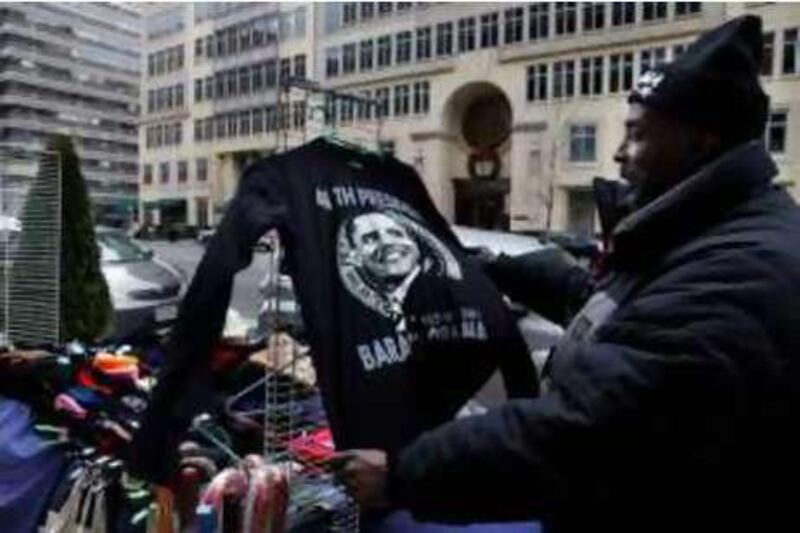WASHINGTON // Traffic will be gridlocked, hotels will be packed and the streets will be brimming with millions of visitors converging on the US capital to partake in Barack Obama's historic inauguration on Jan 20. It will be a day steeped in tradition, and Mr Obama is likely to follow the customs of the 42 men who have preceded him. He will probably begin the day at a church service, as all incoming presidents have done since Franklin Roosevelt's first term. By noon, he will recite the oath of office with his left hand on the Bible, the same one used to swear in his political hero, Abraham Lincoln, on whom the inauguration is themed. And in the afternoon, he will watch a massive parade along Pennsylvania Avenue from a specially built reviewing stand on the White House lawn.
But Mr Obama also embodies a break in tradition simply because of who he will become - the first black president of the United States - and some believe his inauguration too will shatter the moulds of those that came before it. "People will come out of this experience with stories that last a lifetime," said Richard Baker, the historian of the US Senate. "I think time will tell that [previous inaugurations] will be dwarfed by this one."
As many as three million people are expected to flood the capital, far more than the record breaking 1.2 million who watched Lyndon Johnson's inauguration in 1965 and the 400,000 who watched George W Bush's ceremony in 2004. Still, much of the pomp and circumstance will remain the same. Mr Obama will be sworn in by the country's top judge on the west front terrace of the US Capitol Building, which will be festooned with the country's colours: red, white and blue. The two men will stand on a 1,000-square-metre platform and they will be surrounded by about 1,600 people, including members of Congress, top military leaders and governors.
One of the most anticipated moments will be Mr Obama's inaugural address, a speech that is typically short - George Washington, the country's first president, gave the shortest, at just 135 words - but over which Mr Obama and his team of speechwriters will have laboured for weeks. "He can set the tone for the country for the next four years," said Shirley Anne Warshaw, a presidential historian at Gettysburg College in Pennsylvania. "Because of the financial crisis, he needs to be even more uplifting. He needs to look into the future and say we will regain our economic strength."
Historians say Mr Obama, known for his oratory, could prompt comparisons to Mr Roosevelt, who took office in 1933 in the midst of the Great Depression and who uttered the now famous line: "The only thing we have to fear is fear itself." Others have already drawn parallels between Mr Obama and John F Kennedy, whose speech was immortalised when he said: "Ask not what your country can do for you - ask what you can do for your country." Like Mr Kennedy, Mr Obama has often discussed the importance of public service.
And of course Mr Obama will also be striving to echo Mr Lincoln. The 2009 inaugural theme, "A New Birth of Freedom" - which was chosen before Mr Obama was elected - comes from a line in Mr Lincoln's famous Gettysburg Address, delivered in the middle of the Civil War. In keeping with the motif, Mr Obama will take a private charter train from Philadelphia to Washington, following the same path Mr Lincoln took in 1861. As Mr Obama speaks, he will look out across the sea of people in the National Mall in the direction of the Lincoln Memorial.
But Mr Obama will not be the only one with a microphone. Like most recent presidents, Mr Obama has put his own stamp on the proceedings by picking a list of entertainers and speakers to join him on stage. Aretha Franklin, the soul-singing icon, will be on hand as will Elizabeth Alexander, a poet who writes about race relations - just the fourth poet to speak at an inauguration. Mr Obama has also tapped Rick Warren, an evangelical pastor, to offer the invocation, a move that has already sparked controversy because of Mr Warren's staunch opposition to same-sex marriage and abortion.
Mr Obama's first stop as president is likely to be the President's Room, an ornately decorated but seldom-used room that sits just outside the senate chamber. Ronald Reagan began the custom of going there in 1981, when, just after stepping down from the inaugural platform, he went to the President's Room to sign nominations to his cabinet posts and an order for a federal hiring freeze. Mr Obama, who has long talked of swiftly reversing many of George W Bush's policies - including closing the prison camp in Guantanamo Bay, Cuba - could also choose to sign a major executive order as his first official act, experts said.
"Symbolism is so very important on that day, and many people have looked for ways to set new precedents," said Mr Baker, the Senate historian. Still, it is more likely the day will be reserved for celebration. Mr Obama will attend an inaugural luncheon and several exclusive inaugural balls at night. To accommodate the masses, an emergency law has been passed to allow bars to stay open until the morning.
With a looming financial crisis and US soldiers engaged in two wars abroad, however, it is unlikely that the celebratory mood will linger much past Jan 20. "I think it's probably good for people to celebrate a victory and then get down to hard work," said George Edwards, a former director of the Center for Presidential Studies in New York. "There are certainly serious things to do." sstanek@thenational.ae






